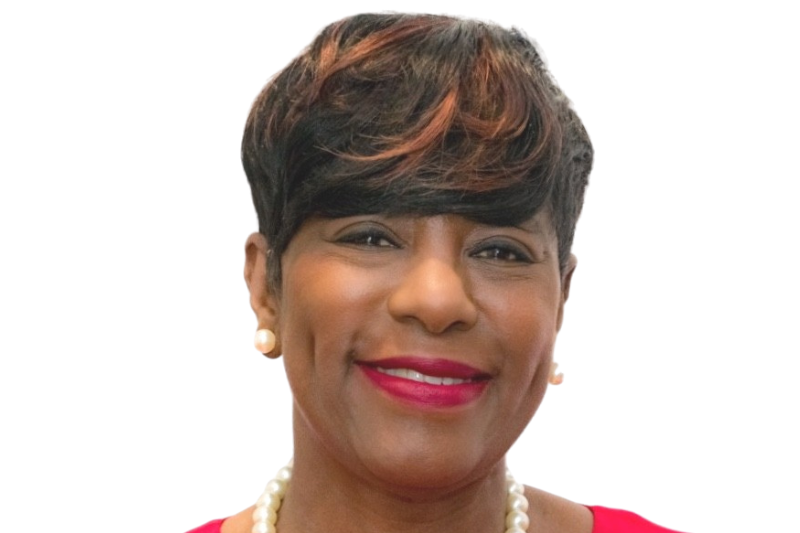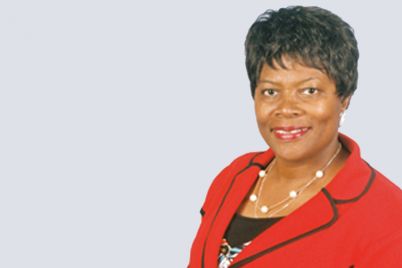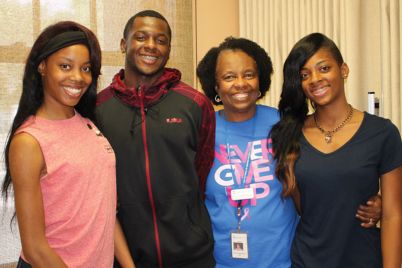Publisher and editor of the ‘Florida Courier’ and its sister newspaper, the ‘Daytona Times,’ Jenise Griffin has had to take antidepressant medication, get counseling and engage in support groups to help cope with her brother’s schizophrenia.
BY JENISE GRIFFIN, The Florida Courier
When I’m not fulfilling my job as publisher and editor of the Florida Courier and its sister newspaper, the Daytona Times, much of my time is spent tending to the needs of my 57-year-old mentally ill brother.
It has been 30 years since my brother was diagnosed with schizophrenia. It was a frightening diagnosis that shook my family to the core. After all, we grew up in a nice, no-drama Christian home of three pretty good kids and two great parents. Our dad had become a pastor late in life, and our mom was the consummate homemaker and ideal preacher’s wife.
A football high school standout who went on to earn a college degree in psychology — of all majors — my brother started acting erratically in the early 1990s. There were delusions, and he began hearing voices that told him negative things about himself.
My father sought help for him through the local mental health center. My sister and I consumed as much information available online at the time. We attended a support group for families offered by the local National Alliance on Mental Illness (NAMI). And we did what people of faith did when faced with a crisis. We fasted and we prayed.
We as a family also kept much of it to ourselves because, at the time, it was a taboo subject, especially for Black church folks, and still is to some degree.
My brother tried but stumbled and fell. Over and over again. He was Baker Acted. He did drugs. Arrests. Jail time.
Eventually, he had to be institutionalized. For 23 years, the state was my brother’s keeper.
He was a resident of multiple mental health hospitals and treatment centers. South Florida Evaluation and Treatment Center in Florida City. North Florida Evaluation and Treatment Center in Gainesville. South Florida State Hospital in Pembroke Pines. Treasure Coast Forensic Treatment Center in Indiantown. Florida State Hospital in Chattahoochee, where he spent the most time.
Most of our holidays over the years were spent on the road – traveling to see him at state facilities where we could only spend a few hours each visit. Trying to make the best of a bad situation, we made sure those visits were filled with chats of hometown gossip, news about family births, weddings and reunions. We offered laughter and loving words of comfort and hope.
After a few years of his diagnosis, we got over the shame. No suffering in silence. As my mom would always say, “Who cares?” My brother had a serious brain disorder and could not survive it without family. Who cared that others knew? Most were dealing with their own trials and tribulations.
My brother was blessed. Many of the residents in those facilities are forgotten. We witnessed many walking around like zombies – sick, heavily medicated and abandoned. And many were African-American men. Somebody’s baby far away, and no balm from home.
A few weeks before my mom died in 2020, my brother was released to the care of my sister and brother-in-law and could see our mother just days before she died at age 90.
My parents are both gone, but my small immediate family is blessed to have a great host of supporters. Extended family members and friends who know our journey offer words of encouragement and support. Just them asking about him and how he’s doing is often enough.
‘More Than Enough’
Mental Health Awareness Month was in May, and the National Alliance on Mental Illness observed it with a “More Than Enough” campaign.
NAMI’s website states: “It’s an opportunity for all of us to come together and remember the inherent value we each hold — no matter our diagnosis, appearance, socioeconomic status, background or ability. We want every person out there to know that if all you did was wake up today, that’s more than enough.
“No matter what, you are inherently worthy of more than enough life, love and healing. Showing up, just as you are, for yourself and the people around you is more than enough,’ it continued.
A post on the website states: “I live with schizophrenia. I am not a burden. I Am #MoreThanEnough.’’
My brother has lived with me now for nearly two years. My sister and her husband are just 10 minutes away, along with my grown niece and nephew, who have been a tremendous help.
I won’t lie. It’s a struggle. I have had to take antidepressant medication, get counseling and engage in support groups to help me cope.
There are still occasional days when my brother’s ready to give up when he asks us to give up on him and let him be cremated. He longs to live the life of someone “normal” – someone not required to take a heavy dose of hard-to-pronounce pills twice a day, attend therapy, see a doctor regularly or attend group classes. There are days when he’s loud and unruly and quite annoying.
And then there are days of great joy when he shares fun childhood memories and shows off his dancing skills at family gatherings. There are the long, glorious chats with his high school buddies who check on him, his jubilance when his sports teams win a game, and the peals of laughter when he’s watching Wayne Brady on “Let’s Make a Deal.”
He lives with schizophrenia. His life has value. He’s showing up, often doing the best he can. And that’s more than enough.
Reprinted with permission from The Florida Courier.
Jenise Griffin is publisher of the Florida Courier and Daytona Times. She also is a past recipient of the Rosalynn Carter Fellowships for Mental Health Journalism. She can be reached at Jgriffin@flcourier.com.







